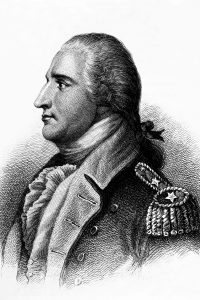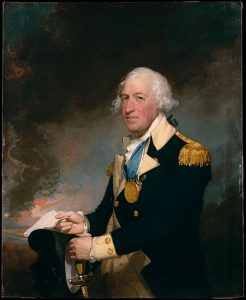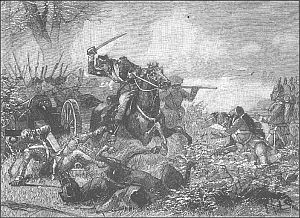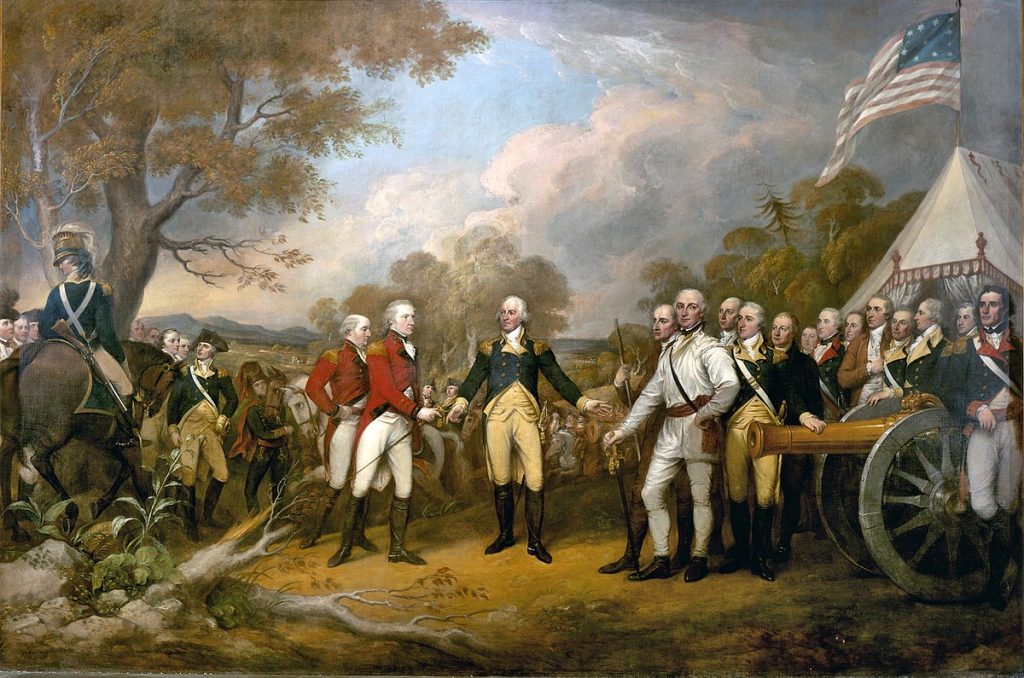In late December of 1776, Benedict Arnold, after numerous occasions of showcasing bravery, leadership, and heroic acts, was left without any notice as the Continental Congress had promoted five junior officers to Major-Generals. Perplexed by this disrespectful act from the Congress, Arnold decided to hand in his resignation to the Continental Army. General George Washington, a strong advocate for the heroic acts made by Arnold, lettered not only to Arnold himself, to voice his utmost respect, but also to the Continental Congress, saying, “Surely, a more active, a more spirited, and sensible officer, fills no department of your army. Not seeing him, then, in the list of major generals, and no mention made of him, has given me uneasiness, as it is not presumed, being the oldest brigadier, that he will continue in service under such a slight.”1 Although appreciative of Washington’s kind words, the feeling of betrayal by his own country overpowered Arnold’s emotions. He hesitated to reconsider his resignation, but ultimately told Washington and Congress he no longer wished to participate in the war. In an odd exchange of events, how did the Continental Congress manage to let one of their brigade officers walk away? Was Arnold undeserving of this promotion, or was he betrayed by his own people?

The success story of Benedict Arnold begins in 1775, when he approached the Massachusetts authorities seeking to be made General. He had a plan to gather troops and make a strong push north into upstate New York in an attempt to capture Fort Ticonderoga. Arnold saw an opportunity in upstate New York to take the fort and obtain the many cannons that sat on the front wall of it. The Massachusetts authorities approved Arnold’s request, and allowed him to follow through with his plan to push north. Arnold gathered his men and made the trek north, where, on the foggy night of May 10, 1775, Arnold and his men, along with Ethan Allen and his “Green Mountain Boys,” stormed Fort Ticonderoga and were able to capture the fort without firing a single shot. Biographer George Hill writes, “The spoils which thus fell into the hands of Americans, consisted of one hundred and twenty pieces of iron cannon, one howitzer, one cohorn, ten tons of musketballs…”2
Arnold became a household military name throughout the Colonies; however, he was far from done with his conquests. Arnold saw an opportunity to invade the only two major cities in Canada: Montreal and Québec, which were seaports for ships traveling down the St. Lawrence River. Arnold believed that the British had yet to hear word that the war had begun and believed he and his men could make a surprise attack on Québec. Arnold then sent a message to General George Washington seeking approval to go forth with his venture into Canada. Arnold’s letter strongly persuaded Washington into allowing the journey, as Arnold strongly believed that he could make Canada the fourteenth colony. Arnold led an army of one thousand troops through the treacherous terrain of Maine in the heart of winter, three hundred and eighty miles up the Kennebec River, and into Québec. It was at this location where Arnold’s men met up with General Montgomery’s men, who had pushed up the St. Lawrence River past Montreal. Arnold and Montgomery agreed to wait in the wilderness of Canada until a snowstorm arrived to successfully carry out a surprise attack. The plan was for Montgomery’s men to push the south end of Québec, with Arnold’s men attacking from the north through the gates of the city. Biographer George Hill writes, “Arnold wrote to Washington, while at Point aux Trembles, that it would take fully twenty-five hundred men to storm Quebec with any hope of success; still they found it necessary to advance to their perilous work with but a trifle more than a third of that number.”3 On the night of December 31, 1775, the snowstorm the men had been looking for finally arrived, and Arnold decided to attack. Montgomery’s men were stopped relatively quickly by British cannons located at the south of the city, while Arnold’s men were able to storm through the city streets and engage in combat with British soldiers. The colonists lost the battle, and about a third of their troops were forced to retreat to New York due to the others being captured or killed by the British. However, one of their biggest losses occurred to Benedict Arnold, who was shot in the leg during the battle and he was severely injured.
As Arnold recovered from his leg injury, an arms race ensued in an attempt to build ships to be used on Lake Champlain. Arnold realized that, although the British controlled the north side of the lake with Montreal, and Americans controlled the south part by Fort Ticonderoga; there was no naval presence on the lake itself. As neither army had a fleet of ships on the lake, the race began to be the first to get ships on the lake. After completion, Arnold led his men towards the center of the lake to stop a Redcoat fleet of ships. With no experienced sailors on board, the Americans faced off with the strongest navy in the world in the Battle of Valcour. The Americans lost almost every ship they brought with them. Still standing was, of course, Benedict Arnold, who took control of the battle and fought a strong defensive attack against the British. He managed to hold off the British army and send them back to Canada without taking control of the lake. Biographer Hill writes, “Arnold’s name was passed over the country with accomplishments of the highest praise. None spoke of him but in terms of admiration. His popularity was secure.”4
Throughout the thirteen colonies, Benedict Arnold was a well-known name for being a heroic and excellent military leader. However, the Continental Congress did not recognize Arnold in the same light as the general public, and it denied his request to be promoted, and instead gave promotions to five junior officers. This infuriated Arnold so much that upon arrival at his home in New Haven, Connecticut, he immediately prepared his resignation letter from the Continental Army. Arnold, in a letter to a George Washington, voiced his feeling of being disrespected by saying, “Their promoting junior officers to the rank of major-generals, I view as a very civil way of requesting my resignation.”5 Coincidentally, while finishing up his resignation letter from the Army, the British Army marched through Connecticut untouched and wreaked havoc on the city of Danbury. The Redcoats then proceeded to seamlessly sack and burn almost the entire city. Arnold, after receiving word of this attack, was forced to put down his resignation letter for the time being and gather as many civilians as he possibly could to fight back against the British. Arnold and his inexperienced civilian troops followed the British through the wilderness all the way back to the sea, where his men caused considerable damage to the British line. This heroic effort by Arnold in fighting off the British, as well as orchestrating creative tactics to pick off their men, caught the attention of the Continental Congress, who reconsidered Arnold’s heroics and promoted him to Major General, which he so clearly deserved. Arnold though, was still not satisfied and decided to return to his original plan of turning in his resignation letter. Arnold had still felt disrespected that the junior officers promoted prior to him still held seniority power over him. On July 11, 1777, Arnold sent in his letter of resignation, which was then denied and returned by General Washington. Washington convinced Arnold to reconsider his resignation, as Washington needed Arnold’s military experience back in upstate New York, because of a British push that was soon to come down the Hudson River. Arnold had always felt respect and validation from General Washington, which is why, after hearing from Washington, he immediately withdrew his resignation letter and headed back up to upstate New York where he would become second in command Major General, behind Horatio Gates. Arnold and Gates were familiar with one another as both had spent time together in Ticonderoga just prior to the Battle of Valcour, and the two had no history of dislike or conflict. The two had seemed to work well together, and Gates had also been an advocate for Arnold’s promotion due to his bravery in battle. The two remained peaceful and amiable with one another for most of the time spent together–that was until the morning of September 19, 1777.6

As the sun began to rise above the horizon and the fog began to clear, an outflank of British soldiers were scouted by Colonist scouts. General Burgoyne was preparing an attack down the west side of the Hudson River in hopes of defeating the Colonist’s army and capturing Albany. Three columns of troops, led by Burgoyne, marched towards the Continental Army led by Horatio Gates. The first column, led by General Fraser with elite British soldiers, moved west in attempt to surround the Continental army. The second column consisted of four British regiments led by General Hamilton and marched directly towards the Colonists. The third and final column was sent east in attempt to take control of Gate’s own flank. Having to rapidly decide where to locate their forces, Gates and Arnold argued through letters for hours in the early morning on which position to take for the battle. Arnold, fearful that his infantry would become pinched by the British, demanded for Gates to allow his men to enter the battlefield and attempt to halt the British center line. Gates wanted Arnold’s men to sit back and await the British army in hopes to fight a defensive battle. The two men disagreed on the subject for hours, until “Finally, Gates gave way before his hot importunity, and the advice of Arnold was carried into effect,” as Arnold’s biographer put it.7 Arnold then led his men onto the battlefield and significantly wounded the British front line, causing over five hundred causalities to the British army while losing just under three hundred.
Arnold biographer Hill writes, “Few men but Arnold could have accomplished what he did under such circumstances. Gates also showed his jealousy of Arnold’s reputation in another way, which was still more noticeable; he refused, in writing his dispatches to Congress, to mention the name of Arnold at all in what he had to say of the battle, but merely stated that ‘the action was fought by detachments from the army.’”8
Arnold felt anger about Gates’ words to Congress and decided to seek out Gates in order to express his frustration. The two Generals proceeded to aggressively argue with one another, sharing malicious comments, and exerting extreme passion. Biographer Hill states, “Gates twitted Arnold with having resigned his office already, and said that he could claim no military standing whatever; he further assured him that he was of no sort of use in the army, and might go home whenever he wanted to; also that General Lincoln would take his command as soon as he arrived in camp.”9 Arnold was then granted a pass from General Gates to exit the camp and head south to join General Washington. Arnold headed back to his tent to pack his things, and upon collecting his thoughts as well as stripping his built-up tension, recognized what a detriment it would be to his men to abandon camp amidst an active battle. Gates, however, had relieved Arnold of his command and had placed himself atop the command of the left wing, despite the fact that he was unwilling to lead his troops onto the battlefield itself.
The morning of October 7, 1777 arrived, and the second day of the Battle of Saratoga began as General Burgoyne marched his British army through the dense wilderness of upstate New York, with their distinct red coats on and muskets in hand, in what was seen as a last chance effort to dismantle the Continental army. As nearly fifteen hundred British soldiers approached the battlefield, Gates sent his left-wing brigade into battle, absent their commander and leader, Benedict Arnold, who had been confined to his tent by General Gate’s orders. As Arnold pondered in his tent, listening to the musket ball shots in the distance, he felt yet again disrespected by his country. Unable to contain himself any longer, Arnold disobeyed Gate’s orders and left the tent, jumped on his horse and rode straight into the battle.
Biographer Hill writes, “He rode with lightning speed up and down the lines, throwing himself into the jaws of death, as if he was willing on that day to become a sacrifice. His horse covered in foam, and seemed to partake of the fiery desperation of its rider. Again and again, he led the troops on the charge, attacking the Hessians in the centre with such fury that their solid lines wavered and finally gave way. He blandished his sword about his head like a glittering flame. His shouts imparted to the troops a great share of his own madness.”10

As the sun began to set, Arnold led one more charge that broke the British lines. Just as he had rode straight through the British line, he had his horse shot out from underneath him, and another musket ball entered into the leg that had been previously injured in the Battle of Québec. Arnold was miraculously removed from battle severely wounded, and immediately put under arrest for disobeying General Gate’s orders. Benedict Arnold had already done what he needed to do; he had pushed the British army back to a point where American troops could surround them. On October 17, 1777, while being surrounded by troops, General Burgoyne had no other choice but to stand down his men and surrender the battle. The two Generals, Burgoyne and Gates, formally met to exchange papers and signatures, Gates, taking all the credit for the victory. Biographer Hill tells us “The Former stepped backwards when he surrendered, and presented the hilt of his sword to Gates.”11 The victory proved pivotal in the war, and thanks to Arnold’s courageous acts, the French were convinced to deploy reinforcements for the colonies and declare war on Great Britain.
Although not looked upon as glamorously as General Gates, Arnold had become George Washington’s favorite general. The next Spring, shortly after the British had retreated from previously controlled Philadelphia, Arnold was appointed Commander-in-Chief of Philadelphia by Washington. While starting his new position, Arnold started to reconsider his position in the military, distraught by the idea that he could no longer fight on the battlefield, and even thought about joining the naval service. Arnold quickly became an important social figure in Philadelphia, and eventually met Margaret “Peggy” Shippen, a much younger woman who came from an elite family who had kept ties to Britain and promoted loyalist sentiments. Arnold and Peggy would proceed to get married in the winter of 1778, and not longer after, Arnold decided to flip his coat after reflecting on his past mistreatment, and his failure to be respected and honored by the Continental Congress. Weeks following his marriage, Arnold made his first attempts to contact British commanders seeking to join the British side. Biographer Hill writes, “The two motives that hurried him on this step, as the reader must see for himself, were his wounded pride and his sordid disposition.”12 Arnold would continue to message generals from the King’s army for the following year, until Arnold agreed to exchange key plans to capture West Point from the Americans in exchange for a large sum of money. In order to go through with his plan, Arnold would need to meet up with General John Andre to exchange the plans, orders, and commands of the attack on West Point. In the middle of the night during early August of 1780, on the shores of the Hudson River, Andre and Arnold met for hours until dawn when the Americans opened fire on the British. Biographer Hill tells us that “Arnold gave Andre a plan of the works at West Point, together with papers properly explaining them; these he told him to conceal between one of his stockings and his foot, and, in case he met trouble, to destroy them.”13 As he was making his way back, Andre was stopped by highwaymen, who discovered the plans in his boot and decided to do the patriotic thing of turning them over to the Americans. General Washington and Arnold were scheduled to meet that morning, unknowing that Andre had been caught. Arnold sat around waiting for Washington’s arrival. That was when a messenger notified Arnold that Andre had been caught and that the evidence signed by Arnold was being sent to Washington. Washington, disgusted by the evidence he had just been handed, ordered for Benedict Arnold to be arrested. Soon the states would erupt into a frenzy as one of their most heroic commanders on the battlefield had turned his back on them and attempted to sabotage the Patriot cause.
In October of that same year, Andre was publicly hanged for being a spy, and Arnold had yet to be captured. Arnold immediately gathered his belongings and sailed off to Great Britain, followed shortly after by his wife, Peggy, who was essentially driven out of Philadelphia. Upon arrival in Britain, Arnold was only presented with a small portion of his bounty, due to the failure to execute the plan fully. He was, however, appointed by Sir Henry to participate in the army. Biographer Hill says “Arnold was now made a brigadier-general in the British Army,” but was never given a command or troops, due to becoming an untrustworthy figure.14 Arnold was granted pensions from the royal military, but he was never accepted in British society, as all of his patriotic war achievements were tarnished by his treason. Washington ordered that Benedict Arnold’s name would never be spoken again and that his father and brother’s graves should be removed in disgust. Arnold would spend the rest of his days in London, England, where, on June 14, 1801, he passed away. Just prior to his death, it is said that Arnold sought out his Continental uniform. Overcome by emotions, Arnold put the blue patriot coat on his shoulders one final time. Biographer George Hill writes, “He had lived both to honor and disgrace it.”15 Arnold’s name would forever live in infamy among the Americans as the man who committed the most disgraceful act, while his heroics on the battlefield were diminished and not to be spoken of heroically.
- George Hill, Benedict Arnold: A Biography (New York: A.L. Burt, 1863), 131. ↵
- George Hill, Benedict Arnold: A Biography (New York: A.L. Burt, 1863), 38. ↵
- George Hill, Benedict Arnold: A Biography (New York: A.L. Burt, 1863), 91. ↵
- George Hill, Benedict Arnold: A Biography (New York: A.L. Burt, 1863), 106. ↵
- George Hill, Benedict Arnold: A Biography (New York: A.L. Burt, 1863), 132. ↵
- George Hill, Benedict Arnold: A Biography (New York: A.L. Burt, 1863), 129. ↵
- George Hill, Benedict Arnold: A Biography (New York: A.L. Burt, 1863), 179. ↵
- George Hill, Benedict Arnold: A Biography (New York: A.L. Burt, 1863), 183. ↵
- George Hill, Benedict Arnold: A Biography (New York: A.L. Burt, 1863), 185. ↵
- George Hill, Benedict Arnold: A Biography (New York: A.L. Burt, 1863), 188. ↵
- George Hill, Benedict Arnold: A Biography (New York: A.L. Burt, 1863), 185. ↵
- George Hill, Benedict Arnold: A Biography (New York: A.L. Burt, 1863), 213. ↵
- George Hill, Benedict Arnold: A Biography (New York: A.L. Burt, 1863), 229. ↵
- George Hill, Benedict Arnold: A Biography (New York: A.L. Burt, 1863), 279. ↵
- George Hill, Benedict Arnold: A Biography (New York: A.L. Burt, 1863), 295. ↵




1 comment
Carlos Hinojosa
I really like the story of Benedict Arnold the traitor the War of Independence. I like it because it shows how easily his betrayal could have been prevented, all the congress needed to do was recognize him and hive him the respect he deserved and earned. This article reminded me of my own which I did on the same person but more on his betrayal. So, I like seeing someone do something I also put much effort in, Great Article and great job.